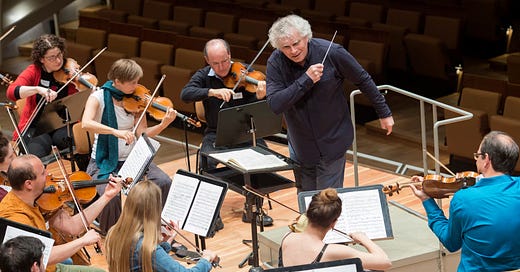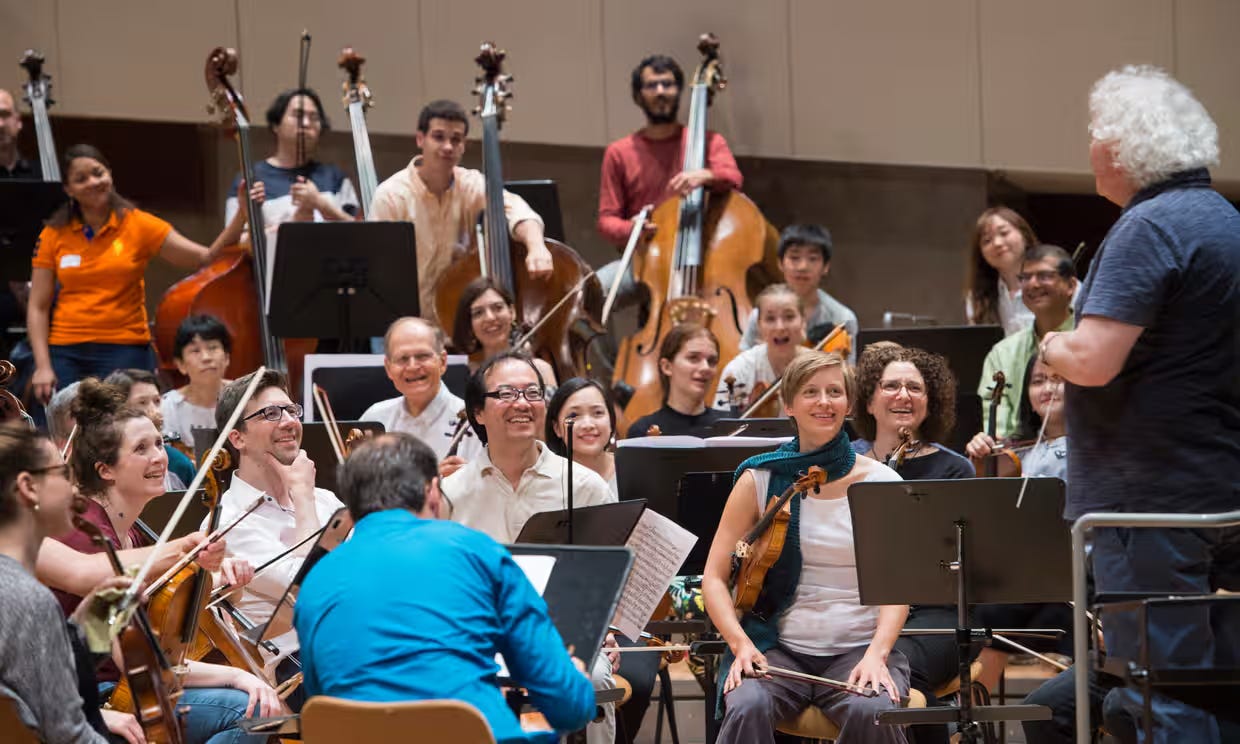Happy birthday, Sir Simon
ARCHIVE On Simon Rattle’s 70th birthday, I look back on five magical days I spent in Berlin in 2018, being conducted by the man himself, as part of a visionary orchestral initiative
First published in The Guardian in June 2018
Simon Rattle is looking straight at me, eyes flaring, fist shaking. I am straining with every fibre of my being to give him what he wants. I would die for this man right now. I’m desperate to shape the phrase just as he’s showing, sustaining the long note and getting louder over the arpeggio. But I over-push the sound, my notes crack, I lose my focus and have to break eye contact to look at the music, ashamed of myself. I’m reminded why I decided not to become a professional musician.
Yet for five days in May, with 100 other amateur musicians, I was allowed to dream. We were the guests of the Berlin Philharmonic Orchestra, selected (by video audition) from 1,900 applicants from 30 countries to be part of the BE PHIL Orchestra, conducted in Brahms’s First Symphony by Sir Simon himself. When we meet for the first time in the foyer of the Philharmonie, we are like giddy children who have won Willy Wonka’s golden tickets.
Over the first two days, we rehearse with conductor and Berlin Phil violinist Stanley Dodds, one of the brains behind the project. He balances and tunes us, points out important lines, characters and details, makes us listen to each other, and gives us an idea of Rattle’s tempos. On day three we learn that Rattle is in the building – a buzz goes round the coffee room and everyone tries to act normal. And then he’s on the podium welcoming us. ‘I’m so delighted. Thank you so much. I can’t wait. Let’s just play some Brahms.’ And how we play: our focus and energy are through the roof.
In our six hours of rehearsal with Rattle, his enthusiasm and commitment never wane. He offers historic context: Brahms only added the introduction after hearing Wagner’s Tristan und Isolde, so although usually his music should never sound like Wagner this is an exception. There are narratives to help bring out the emotional complexities: one bar, Brahms is full of longing for Clara Schumann; the next he remembers he’s living in the house of her husband and his mentor. Jokes: Woody Allen’s one about his brain being his second-favourite organ (for when the double basses aren’t following the baton). Analogies: Siegmund Nissel of the Amadeus Quartet’s likening of the string quartet to a bottle of wine applies also to orchestras: the cellos are the bottle, the first violins the label – but the second violins and violas are the wine itself.
There are rare compliments: ‘It’s so great to play [the symphony] with an orchestra that hasn’t played it 10,000 times.’ And the occasional insult: ‘You are the first bass section I’ve met that plays faster than the rest of the orchestra.’
We also witness flashes of frustration: when people don’t watch him, play too loudly, forget instructions and especially when we don’t go with his tempos. A few times he taunts us on our tuning, but gently, despite how much it must grate to hear such muddy imperfection. It’s a little wounding, however, that in some bars he conducts every beat to help us stay together, as if we are a school orchestra.
Interlaced with the frustrations are moments of intense joy. I’m reduced to tears hearing the yearning oboe and violin solos in the second movement, and the alpine theme in the horn and flute, played exquisitely by my new friends, knowing that they too are doing this for love and fulfilment. At the glorious last-movement theme, I am brimming with love for Brahms, my colleagues, for sheer joy of being alive.
We prove the cliché that music is an international language. We come from countries and cultures as various as Brazil, Bolivia, Trinidad, Taiwan and Turkey; we range in age from 10 to 75. Some of us went to conservatoires, some not; among us are students, postmen, teachers, software developers, office managers, doctors, airline pilots and scientists. I sit next to a Japanese research scientist, and even though our conversation is sometimes stilted, it’s easy to play with him. It’s the cultural mores beyond the music that are confusing: whether to shake hands or hug after the concert; the toilet queue that forms because none of the non-Germans understands the flush system.
Our concert is part of the Philharmonie’s open day. Around the building are concerts by children, students and Berlin Phil players, masterclasses, tours, a horn flashmob, world music, premieres. More than 10,000 people pour into the building; 6,000 more watch on the Digital Concert Hall and 200,000 on Facebook.
At the end of the dress rehearsal, Rattle exhorts us to have fun, tell our story – and make mistakes. We take him at his word. Our performance is full-throttle, but some things we rehearsed don’t work. Most do. It doesn’t matter, though, because we’re giving it all we have. Rattle is, too. The audience goes wild and he gets three call-backs as we stand on stage dazed and a little heartbroken that it’s all over.
Back in London, aglow with the stardust that’s been sprinkled on my musical life, I return to my regular amateur group, Corinthian Chamber Orchestra. Contrary to a popular narrative, most of my orchestral friends are not “posh”. Most got into playing music at school and through the local authority-funded services and youth orchestras that have been devastated in recent years. As the effects of the government’s policy of excluding arts subjects from the Ebacc core subjects are becoming apparent, access to a life with music is increasingly limited to those who can afford it. Rattle himself recently wrote a letter to the Times about the current destruction of music education. ‘The future may be uncertain and difficult for the next generation, but unless they have access to a vital cultural education they will be utterly unprepared for what this new world might require.’
This is not just about children, though. What of the consequences 30 years down the line? What then of amateur music and its benefits to the individual and to society – the friendships and social networks, good mental and intellectual health, creativity and sheer joy? As we face existential crisis, along with epidemics of dementia and loneliness, amateur music-making is more important than ever.
For many professionals, amateurs are the untouchables of the classical music world – unglamorous and unteachable. Rattle and the Berlin Phil’s unique initiative is a visionary act of idealism and generosity that demonstrates their stated commitment to the benefits of music from cradle to grave. If I may pile yet another expectation on the conductor’s arrival in the UK as music director of the London Symphony Orchestra, it is this: I hope he brings this big-hearted, inclusive, life-changing approach with him, and that politicians, cultural institutions and his colleagues take note. Playing Brahms with him in the Philharmonie will always be a privilege – one of the greatest of my life – but having an active and inspiring music life, at any level, should not be.





